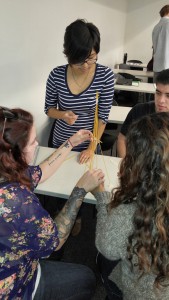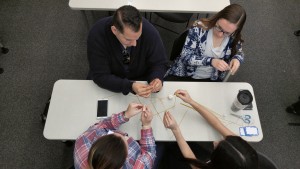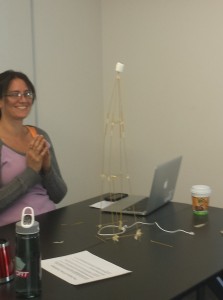Marshmallows are Metaphors
Day 1 of the Interdisciplinary Research Learning Community (IRLC) focused on building marshmallow towers. The marshmallow challenge gives students 18 minutes to create the tallest possible tower–using 20 pieces of uncooked spaghetti, one yard of string, and one yard of masking tape– that can hold a  single marshmallow aloft without human support.
single marshmallow aloft without human support.
Studies show that business executives do the worst job with this challenge, while kindergarten students perform the best. Scholars who study marshmallow tower construction suggest that the success of young children is owed to their willingness to proceed on a trial-and-error basis, allowing for mistakes and mid-course corrections. Executives plan and, if the plan fails, have little to no time to adjust their strategy.
The challenge is an apt metaphor for the research process.
- Rarely do we have the raw materials we would like to have to achieve our goal. Faced with a problem we often have to use the material that we have at hand. This is not to say that researchers should be satisfied with the materials at hand. In my work with Scott Frisch we have railed against this approach. However, armed with the best resources one can lay one’s hands on, the research process needs to move forward. That said, the “perfect” should not be the enemy of the “good.”
- As with the construction of the tower, the research process is not a linear process moving inexorably toward an “optimal solution.” There are false starts, dead ends, and difficult decisions to start over’; or even quit. Sometimes things work. Sometimes they do not. One must be willing to adopt an ethos of “bold experimentation.” In the words of president Franklin Roosevelt: ““It is common sense to take a method and try it; if it fails, admit it frankly and try another. But above all, try something.”
- Like building marshmallow towers, research is difficult and uncertain. One of my favorite readings is a short article (which we assigned to the students) titled “The Importance of Stupidity in Scientific Research.” In the article Schwartz reminds us that ‘What makes [research] difficult is that research is immersion in the unknown. We just don’t know what we’re doing. We can’t be sure whether we’re asking the right question or
 doing the right experiment until we get the answer or the result.”
doing the right experiment until we get the answer or the result.” - There is no “optimal solution” (though I am sure some engineers would disagree) to the challenge. As I watched the students working away, I wondered if they thought that we had an optimal solution in mind; that we would show them at the end what “they should have done.” The challenge does not have an optimal solution. There is no “right answer.” As with the research process, the challenge is about moving toward a goal (an answer to a question) but minus any prescribed path.

One of two winning towers - Research is a collaborative experience. Whether it is active collaboration in research groups or an individual researcher toiling away, our research takes place in a web of social relationships. Even the “lone wolf” researcher is reliant on the work of others.
Compared to CEOs and Kindergartners our students did well. All four groups were able to create a tower (not all groups can). Each group built a tower of more than 20 inches (better than the CEOs on average, less than the 30+ inches of the Kindergarteners), and the winning groups (there was a tie) held the marshmallow 27 inches above the surface of the table.
The marshmallow challenge is a fun icebreaker. But it is also an apt metaphor for the nature of the research and creative processes students are engaged in.
